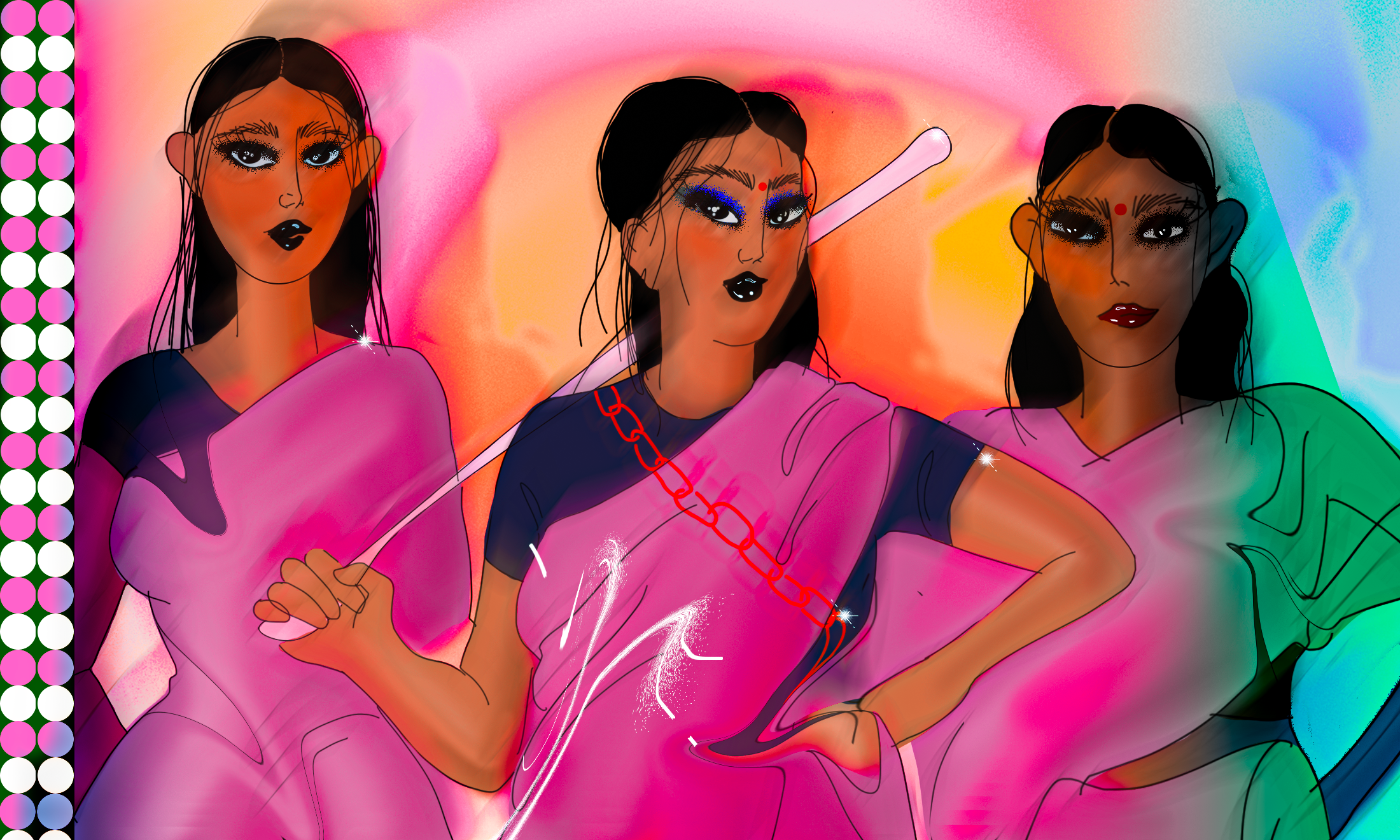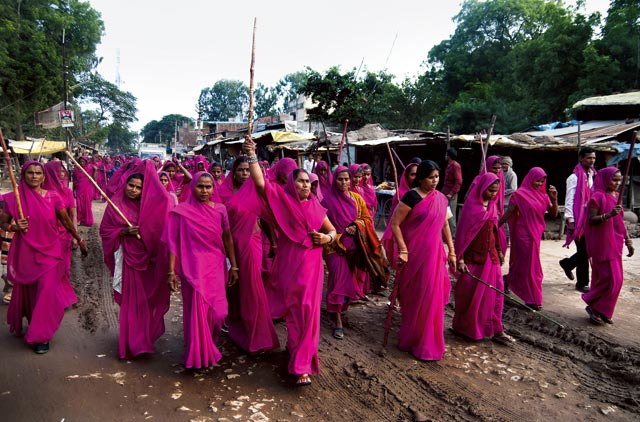TW: discussions of domestic abuse
The Amber Heard versus Johnny Depp trial was translated into highly-sensationalized TikTok fodder. Megan Thee Stallion became the target of a violent shooting incident and was subject to scrutiny in a court ordeal where Tory Lanez’s father was more incensed about Roc Nation than the evidence that his son is violent. Angelina Jolie’s allegations of ex-husband Brad Pitt’s physical abuse during the tenure of their marriage didn’t seem to matter at the Golden Globes. This past year there have been a number of troubling high-profile PR campaigns to rescue the public perception of men who have been accused of violence towards women.
But who fights for survivors? In 2006, in India‘s Banda district of Uttar Pradesh, 61-year-old Sampat Pal Devi came across a similar incident taking place on the streets in broad daylight – a man beating up his wife. Unlike other passersby who carried on about their business, dismissing this as a ‘private family matter’, Sampat decided to intervene and ended up being abused in the process. That’s not where the story ends though, the following day she returned with five other women holding bamboo sticks and gave the man a taste of his own medicine.
Sampat didn’t even know it then, but that was the telling beginning of a relentless sisterhood that would come to be known as Gulabi Gang (in Hindi, ‘gulabi’ means pink) and have over 12 million women from all over India attached to the movement. In Uttar Pradesh itself, the base of this organisation, numbers indicate that almost 35% of married women between the ages of 18 and 49 years have experienced spousal violence. “We aim to help women who are suffering and oppressed but have no one to turn to. In smaller towns and villages, many women are uneducated, unaware of their rights and dependent on their often abusive husbands for their livelihood. Without financial resources of her own and turned away from the legal system that does little to help the underprivileged, many of them are left feeling distressed and helpless. Gulabi Gang was born to help these women fight back with the help of community”, says Sampat.
“In India, around a third of women have been domestically abused at least once after the age of 15”
Violence against women continues to be rampant. In India, around a third of women have been domestically abused at least once after the age of 15. The Gulabi Gang is a local solution to a global issue. Just turn your attention to the recent World Cup for proof where research indicated that domestic abuse incidents increased by 38% when England lost a match and by nearly 26% even when England wins or draws. Either scenario spells distress for many women who face the brunt of their partner’s increased alcohol intake and wavering emotions during a match.
While today there are plenty of safe spaces for women, both offline and online, to seek solace in threatening situations, not everyone has the means or options to access them. In India, particularly in the rural and regional districts, plenty of physical, emotional or sexual abuse continues to take place behind closed doors that is hushed-hushed into nothingness.
However, it’s hard to ignore or overlook a rally of women on the streets decked in vibrant pink saris commanding attention, equality and solutions. The movement has a unified symbol or dress code to establish a consistent identity. Initially, Sampat realized that choosing a colour proved trickier than it seemed because everything was already attached to an initiative. Blue was closely associated with an existing political party named Bahujan Samaj Party, yellow represented members of Uttar Pradesh’s Gayatri Pariwar charity while white was known to be the colour of Brahma Kumaris who led a worldwide spiritual movement to cultivate personal development. One fine afternoon, while navigating a bustling clothing market, a pink sari caught Sampat’s eye and she instantly knew this would officially enable Gulabi Gang into being.
“Gulabi (pink) is very closely associated with beauty. Just think about it – our country’s national flower is a lotus. Indian women are often seen wearing pink saris, pink sindoor (a dyed powder traditionally worn by married women in their hair), pink nail polish or even pink lipstick. No colour better represents feminine power and unity.”
It’s clear that this organization’s strong-headed matriarch has her sights set on more than vigilante justice. Gulabi Gang trains women to be self-sufficient and earn their own livelihood by learning embroidery and other practical skills. The group is a grassroots attempt to plug the gaps left by the state for women’s well-being. “The government is for us, we are not for the government. I’m not here to appease the authorities or plead my case”, she says and vehemently questions the current justice system that didn’t live up to the promises it made to the economically deprived.
During our conversation, I could hear the murmur of some people in the background, and upon asking, Sampat reveals that she is currently in the company of four women who’ve travelled for days at an end from different parts of the country to seek her help regarding various issues. Whilst one is seeking escape from a turbulent marriage, another’s family property is in the illegal clutches of a third party and the authorities have failed to retrieve it. Not just that, some of these women are beaten up or cast out of their homes for not meeting the dowry demands of their in-laws. Gender bias has reduced but continues to be a huge concern in conservative families; in-laws favour the birth of boys and blame the woman if she conceives a girl instead as the latter is considered a burden and less capable of carrying forward the family name.
“I’m not here to appease the authorities or plead my case”
Sampat follows a stringent process with each case. “I listen thoroughly, go through the relevant documents or evidence if any and figure out if the concern is legitimate. I don’t have the means to provide financial support of any kind and that’s something I make clear from the beginning. If possible, I try to resolve the matter internally by approaching the woman’s partner or family. Depending on the severity of the situation, the wife may or may not be present during these talks. Gulabi Gang acts as an intermediary to work out an amicable solution because relying on external litigation processes is often draining and costly. If the issue is out of control, we go to the relevant authorities and refuse to budge until the problem is taken care of”, shares Sampat. Their approach today is less reliant on retaliating with actual physical violence which would essentially be like fighting fire with fire, instead they’re focusing more on mutual cooperation.
Her way of activism is just as distinctive as her personality and she is grateful for her husband’s support through this entire journey. Despite being at the receiving end of criticism from society for supporting and giving wings to his wife’s supposedly radical thoughts, Sampat claims her husband as an integral part of the Gulabi Gang family.
Our conversation comes to a close with a note of optimism yet radical awareness about the current state of affairs in the country. Sampat adds: “India has made significant progress in the last decade and it’s heartening to see women studying in university, working in office jobs and holding important positions in the government that is traditionally reserved for men. However, there is still a lot of work to be done and we know how to fight for change.”
The contribution of our members is crucial. Their support enables us to be proudly independent, challenge the whitewashed media landscape and most importantly, platform the work of marginalised communities. To continue this mission, we need to grow gal-dem to 6,000 members – and we can only do this with your support.
As a member you will enjoy exclusive access to our gal-dem Discord channel and Culture Club, live chats with our editors, skill shares, discounts, events, newsletters and more! Support our community and become a member today from as little as £4.99 a month.


